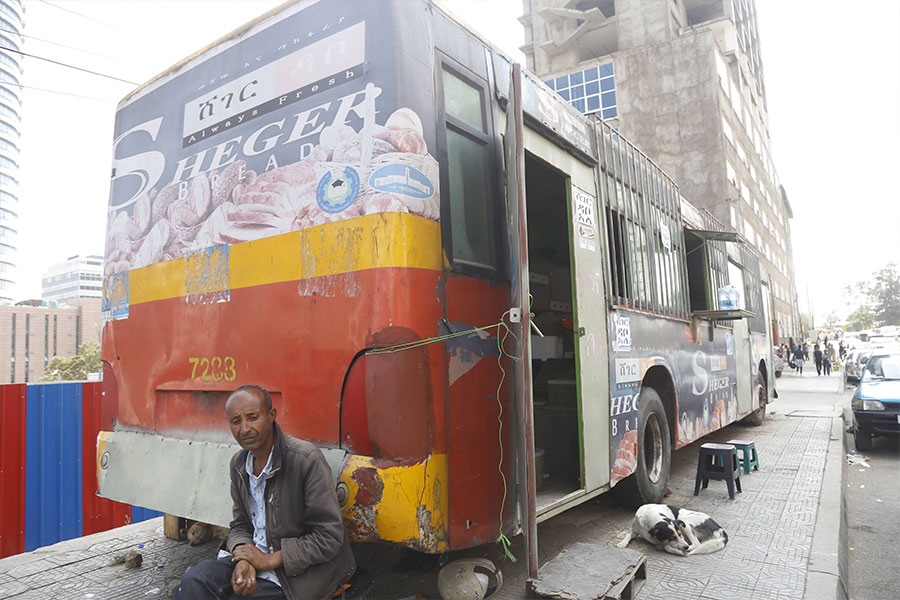
Films Review | Oct 31,2020
The money used to come like clockwork, 300 dollars every holiday, sent by a daughter working as a live-in domestic worker in Dubai, United Arab Emirates. It was one of the sources of income for Yehunelesh Arega and her husband Ashenafi Tarekegn, who live in the Gotera Condominium neighbourhood of Addis.
Two weeks ago, Yehunelesh was waiting for her daughter to send money for the Ethiopian New Year holiday as usual. However, nothing has come since her daughter's work dried up amidst the Novel Coronavirus pandemic (COVID-19).
Yehunelesh was deeply concerned since her husband's income does not cover the family's expenses for the holiday since what he earns working as a security guard is low.
"My daughter left my side to support me and her father in our old age," said Yehunelesh, a 65-year-old housewife standing at the door of the branch of Awash Bank in Lancha. "I have been going to the bank every single day to check if there is anything coming from her."
Yehunelesh suspects that her daughter's employers might not be paying her due to the pandemic.
"She has never been this late," Yehunelesh said. "My husband and I wouldn't know how to welcome the holiday without her assistance."
A virus that started its journey in Wuhan, China, has marched across every country in the world. A faint memory of honking cars and people in a hurry is juxtaposed with this new reality.
A lot of workers have had their salary cut or lost their job because of the virus. Many businesses have closed their doors permanently. Many individuals are no longer able to send money to relatives and friends back home who rely on these remittances to live.
In 2019, low and middle incoming countries received 554 billion dollars in remittances. During the current year, this figure may fall by 20pc, according to the World Bank.
Ethiopia has lost half a billion dollars compared to last fiscal year when the country earned 4.8 billion dollars, which is also lower than the 5.3 billion dollars obtained the previous year.
Most of the money comes from countries in the Middle East and Asia including the United Arab Emirates, Israel, Lebanon, Saudi Arabia and Kuwait. These corridors are primary destinations for domestic workers and brought in close to 771.3 million dollars in the just-ended fiscal year, with the largest share coming from the United Arab Emirates.
These numbers are punishing bankers anxious to have larger shares of the foreign currency pie. One of the 466 branches of Awash Bank, located around Lancha, has only seen two remittance customers a week ahead of the New Year. Two is a death knell for the branch, which is used to serving close to five remittances at this time of year.
"There is no footprint of people coming in for remittance exchanges," said Selamawit Refera, branch manager of Awash Bank, a pioneering private commercial bank with paid-up capital of 5.9 billion Br. Awash grossed 4.2 billion Br in profit in the just ended fiscal year.
Most of the remittances flowing to Selamawit's branch are from Saudi Arabia, Dubai and the United States, according to the manager.
"We've been trying to reach out to our regular customers, asking them how they are doing and if everything is okay," said Selamawit. "Most of them say that their family members on the other side of the world aren't going to work and that most of them are struggling for themselves as well."
The foreign currency flow has sharply fallen after the onset of the virus, but the banks were expecting it would recover during the holiday.
"After the pandemic proliferated all over the world," she said, "there was really nothing coming in for us."
Managers at the Commercial Bank of Ethiopia (CBE), the state-owned giant and one of the big recipients of foreign currency, are also witnessing the slowdown of customers flocking to the Bank to receive remittances.
"At this time of year, we usually serve close to 10 customers a day with a minimum of five a day," said one bank manager who wished to remain anonymous. "Now we have only served three customers the whole week."
The branch manager suspects more customers that regularly receive remittances are now transacting through the parallel market, because some of them just ask for their balance at the Bank when expecting local currency deposits.
Bank strategists are desperate to fix the situation and have been attempting to incentivise their customers with tantalizing lotteries for houses, cars, televisions and mobile card raffles.
Awash Bank, which used this method last Easter, is now giving out mobile cards of 100 Br and 50 Br to the remittance recipients.
CBE has also issued a new lottery to attract consumers.
"It's not really working out with these lottery gifts as it did before," CBE's branch manager added. "People who used to come to exchange foreign currency in person are now non-existent."
It has been a struggle for the sector on the remittance flows after COVID-19 came along, according to Asfaw Alemu, president of Dashen Bank.
"It's not something we can control, and it has been growing worse as the months go by," he said.
"We've been trying to communicate with customers if the lockdown is affecting them or the loss of jobs or salaries," he added. "It's the combination of all these factors that are resulting in the slowdown of remittances."
The lowest recorded remittance flows in the formal market post-COVID-19 was in April, when it registered 187.3 million dollars. During the previous fiscal year, the average monthly individual cash remittance flow was over 210 million dollars.
The foreign exchange challenge of the country has been made even worse. The net foreign assets of the National Bank of Ethiopia and commercial banks showed a respective decline of 367.2 million dollars and 53.7 million dollars, until the third quarter of the past fiscal year, leading the gross foreign reserve coverage to cover just 1.6 months of the current fiscal year's import bill.
"We expect the decline to continue until the last quarter of the year," said Wondoessen Teshome, president of Enat Bank. "We think people would realise the virus might be something we have to live through, and we expect a recovery in 2021."
"It's only a matter of time, but through this, our dependency on remittances is greatly affecting us," said Wondoessen.
Another expert agrees with the banker on the country's dependency on remittances for forex.
The country is and will remain structurally dependent on external finance such as borrowing, remittances and aid for years to come, according to Alemayehu Geda (PhD), a macroeconomist and lecturer at Addis Abeba University's School of Business & Economics.
"We're seeing a great effect of this economic shock on the continuation of the foreign exchange shortage if capital flows and remittances are not coming forward as before," he said.
"This will maintain pressure on the deprecation of the exchange rate," he added. "Inflation will be on the rise as the government depreciates or devalues the currency with this development."
Also, the government should note that out of the 15 million people who are of working age, only 3.9 and 3.1 million are employed by a company or self-employed, respectively, according to the expert.
"This means about two unemployed people are dependent on one employed person - they are receiving support from families through remittances and relying on relatives," he added.
Yehunelesh, who was eagerly waiting for her money, is now more concerned about the health of her daughter.
"I just want my daughter to be okay," said Yehunelesh. "The rest will be fine after this virus is over."
PUBLISHED ON
Sep 19,2020 [ VOL
21 , NO
1064]

Films Review | Oct 31,2020

Editorial | Nov 16,2024

Radar | Jul 11,2021

Agenda | Dec 19,2021

Radar | Nov 14,2020

Fortune News | Mar 19,2022

Commentaries | May 02,2020

Radar | Jul 11,2021

Fortune News | Jun 27,2020

Radar | Oct 09,2021

Dec 22 , 2024 . By TIZITA SHEWAFERAW
Charged with transforming colossal state-owned enterprises into modern and competitiv...

Aug 18 , 2024 . By AKSAH ITALO
Although predictable Yonas Zerihun's job in the ride-hailing service is not immune to...

Jul 28 , 2024 . By TIZITA SHEWAFERAW
Unhabitual, perhaps too many, Samuel Gebreyohannes, 38, used to occasionally enjoy a couple of beers at breakfast. However, he recently swit...

Jul 13 , 2024 . By AKSAH ITALO
Investors who rely on tractors, trucks, and field vehicles for commuting, transporting commodities, and f...

Nov 1 , 2025
The National Bank of Ethiopia (NBE) issued a statement two weeks ago that appeared to...

Oct 25 , 2025
The regulatory machinery is on overdrive. In only two years, no fewer than 35 new pro...

Oct 18 , 2025
The political establishment, notably the ruling party and its top brass, has become p...

Oct 11 , 2025
Ladislas Farago, a roving Associated Press (AP) correspondent, arrived in Ethiopia in...